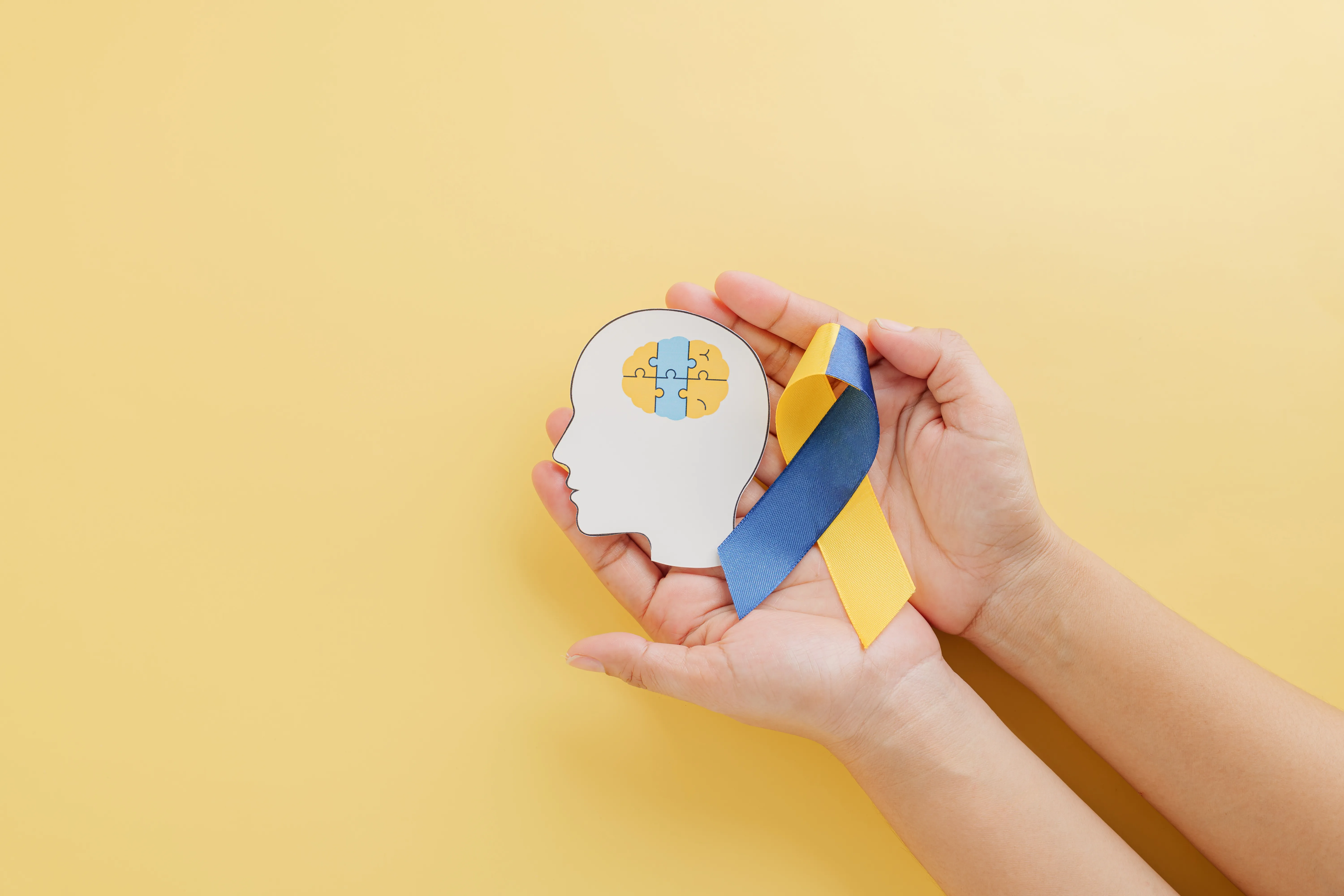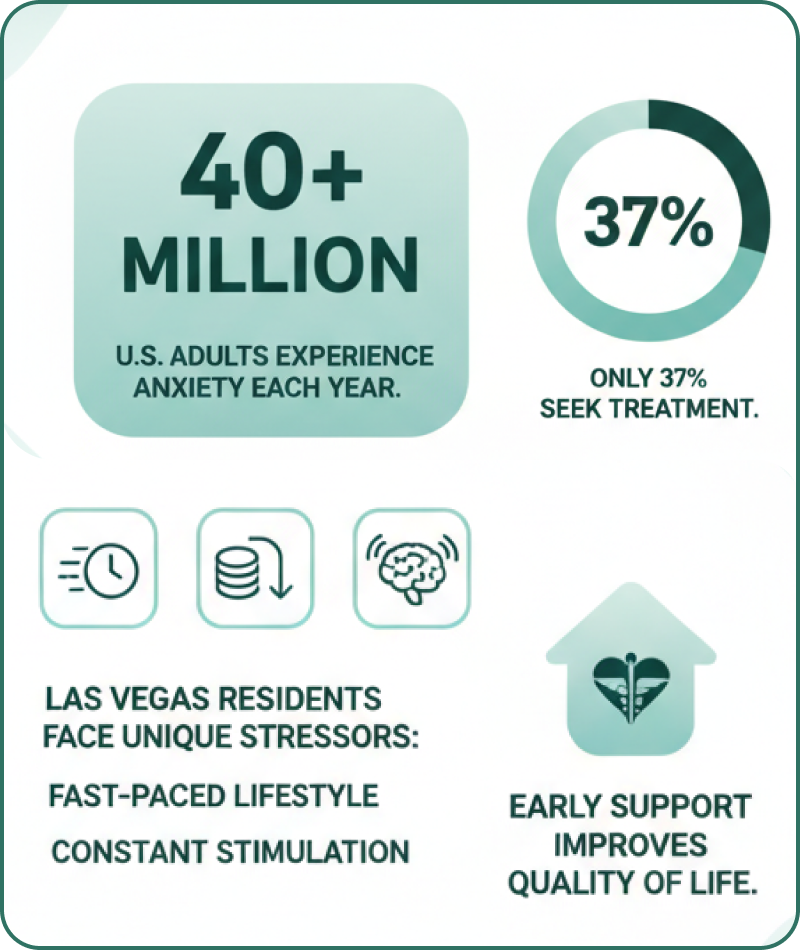At Halo Mental Health, located near the heart of Las Vegas, we specialize in providing cutting-edge addiction treatment and mental health services. Our dedication lies in offering compassionate care to those struggling with substance use disorders, helping illuminate the path to recovery and a fulfilling life.

Understanding Addiction
Addiction is a complex mental disorder that profoundly impacts a person's life, categorized by the Mental Health Services Administration and the National Institute on Drug Abuse as a chronic disease of brain function. Understanding the nuances of drug addiction, substance use, and the diagnostic criteria outlined in the Diagnostic and Statistical Manual is the first step towards effective treatment.
.png)
Addiction Statistics in Las Vegas
Addiction continues to be a critical public health issue in Las Vegas, impacting thousands of residents each year. In 2023, Nevada reported some of the highest rates of substance use disorders in the country, with Las Vegas accounting for a significant portion of these cases. Commonly abused substances include alcohol, xanax, opioids, and methamphetamines, with gambling addiction also being a major concern given the city's unique environment. Addiction often co-occurs with mental health conditions such as depression and anxiety, further complicating recovery efforts and highlighting the urgent need for comprehensive treatment options tailored to Las Vegas residents.
Despite the challenges, recent initiatives have improved access to addiction treatment services in Las Vegas, including detox programs, inpatient and outpatient rehabilitation, and telehealth counseling. Public awareness campaigns and community outreach programs have also played a role in reducing the stigma surrounding addiction, encouraging more individuals to seek help. By continuing to expand resources and focus on prevention and recovery, Las Vegas can address the growing addiction crisis and support residents on their path to long-term wellness.
.jpg)
Our Services
Halo Mental Health is proud to offer a range of treatment programs designed to address the unique needs of individuals facing substance abuse. From initial diagnostic assessments to the creation of personalized treatment plans, our services are tailored to ensure the best outcomes for our clients.

Treatment Modalities We Offer
Our treatment options include a blend of traditional and innovative therapies:
- Cognitive Behavioral Therapy (CBT) helps patients understand the thoughts and feelings that influence behaviors.
- Dialectical Behavior Therapy (DBT) focuses on providing therapeutic skills in four key areas: mindfulness, distress tolerance, emotion regulation, and interpersonal effectiveness.
- Medication-Assisted Treatment (MAT) is used to manage withdrawal symptoms and reduce cravings.
- Group Therapy offers a supportive environment to share experiences and coping strategies.
- Family Therapy involves family members in the treatment process, promoting healing and understanding within familial relationships.
.png)
Specialized Programs
We address a spectrum of substance use disorders and related mental disorders through:
- Targeted programs for drug abuse and substance use disorder.
- Dual diagnosis treatment for those with co-occurring mental health conditions.
- Aftercare and relapse prevention strategies to maintain long-term recovery.

Our Team
Our team of mental health professionals is trained in the latest therapeutic techniques and is backed by the Mental Health Services Administration guidelines. We work together to provide a comprehensive, multidisciplinary approach to addiction treatment.

Why Choose Halo Mental Health?
Choosing Halo Mental Health means opting for a provider that understands the intricacies of substance use disorders and offers proven, evidence-based treatment programs. Our commitment to holistic care extends beyond treating symptoms to addressing the root causes of addiction.

Getting Started with Treatment
Embarking on treatment begins with a comprehensive assessment to understand each individual's needs. Our outpatient programs are designed to integrate seamlessly into a person's life, allowing for recovery without stepping away from daily responsibilities.

Insurance and Payment Information
We believe that financial constraints should not prevent anyone from accessing quality care. We accept a wide range of insurance plans and offer assistance with insurance verification and flexible payment options.

Contact Us
If you or a loved one is seeking help for substance use or drug addiction, don't hesitate to reach out to Halo Mental Health (702) 718-7353. Our team is here to guide you through your options and support you every step of the way towards recovery.
FAQs
Our FAQs section addresses common concerns about addiction treatment, outpatient treatment options, and how to support family members through recovery. At Halo Mental Health, we're committed to providing the information and support you need to make informed decisions about your health and well-being.
1. What is the difference between substance abuse and substance use disorder?
Substance abuse refers to the harmful or hazardous use of psychoactive substances, including alcohol and illicit drugs. Substance use disorder, however, is a medical condition diagnosed when an individual's use of alcohol or drugs leads to health issues or problems at work, school, or home. It's characterized by the inability to control substance use, despite the negative consequences.
2. Can addiction be cured?
While addiction is considered a chronic disease, it is manageable. There is no one-size-fits-all "cure" for addiction, but through comprehensive treatment programs, individuals can achieve and maintain long-term recovery. This often involves a combination of medication, counseling, and support groups to help manage the condition over a lifetime.
3. How do I know if I or someone I love has an addiction?
Signs of addiction can vary depending on the person and the substance but generally include a strong desire to use the substance, difficulties in controlling its use, persisting in its use despite harmful consequences, a higher priority given to drug use than to other activities and obligations, increased tolerance, and sometimes physical withdrawal symptoms.
4. Are there different treatment options available for addiction?
Yes, there are multiple treatment options available for those struggling with addiction, including outpatient treatment programs, inpatient rehabilitation, medication-assisted treatment (MAT), cognitive-behavioral therapy (CBT), family therapy, and support groups. The appropriate treatment approach depends on the individual's specific needs, substance use disorder severity, and any co-occurring mental health conditions.

.webp)
.avif)
.svg)
.svg)
.svg)
.svg)
.avif)
.svg)
.svg)
.svg)
.svg)
.svg)
.svg)
.avif)

.svg)
